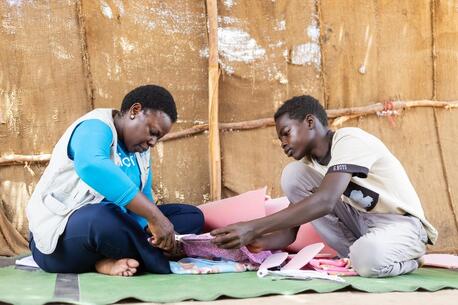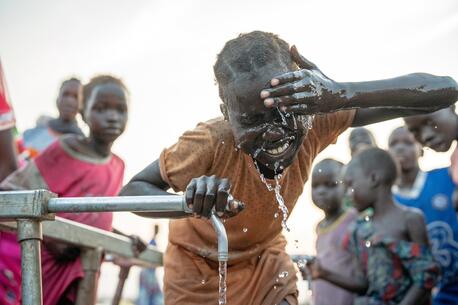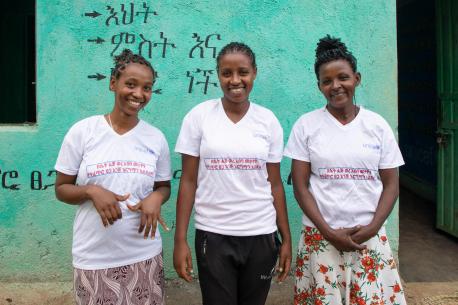
Breaking Taboos: One Boy's Mission to Support Menstrual Hygiene in Sudan
It is not every day that one meets an adolescent boy so passionate about supporting his female peers with the challenges posed by menstruation.
Making reusable sanitary pads to help his sisters and other girls and women in his community manage their periods
Samer, 16, sits quietly under a shade, carefully measuring and cutting fabric and sponge, and stitching the pieces together. He is making a reusable sanitary pad. It takes him less than 15 minutes.
On an ordinary day, Samer makes 20 of them — enough to relieve 20 adolescent girls from the shame and difficulty of managing their periods.
In Sudan, as in many other countries, it is taboo for boys and men to publicly associate with or even speak about menstruation. Samer is changing the narrative.
Displaced from his home in Khartoum by the war, Samer has witnessed female peers struggling to obtain sanitary pads.
"Some disappeared for days, while others were stained because they lacked even one pad," Samer recalls.
Watch the video:
In Samer's community, displaced parents and caregivers struggle to make ends meet. With no sources of income, many cannot afford to buy sanitary pads at the market.
At home, Samer watched his mother struggle to provide them to his sisters. He has since vowed to help ensure that girls — especially those who are displaced — have what they need to manage their periods safely and with dignity, regardless of what society thinks of him.
"I do not feel ashamed," he says. "The needs are more important and go far beyond people's feelings."
When Samer arrived with his family in Atbara, he enrolled in the hygiene club at a UNICEF-supported child-friendly space. He was later selected as one of the role models to attend a UNICEF-supported workshop on menstrual hygiene management, where he was introduced to making reusable pads.
He has never looked back. Samer has since mastered the art of making these essential items which today benefit hundreds of girls in his community, including his four sisters.
I do not feel ashamed. The needs are more important and go far beyond people's feelings. — Samer, 16
To further support his great work, UNICEF continues to provide the fabric, sponge, scissors and sewing kits he needs to keep up the supply.
"I make the pads here at home, and I give them to women and girls free of charge," he says. Every day, girls and women come to his home to pick up sanitary pads. Samer has also designed a small fabric bag to carry them in.
On other days, Samer joins fellow hygiene club members at gathering sites for the displaced, to teach others how to make and use reusable menstrual products and to reinforce positive social norms around menstrual hygiene management.
Samer is also a member of the environmental club, dedicated to educating communities on the impacts of climate change on children.
UNICEF works in over 190 countries and territories in relentless pursuit of a more equitable world for every child. Learn more.
HOW TO HELP
There are many ways to make a difference
War, famine, poverty, natural disasters — threats to the world's children keep coming. But UNICEF won't stop working to keep children healthy and safe.
UNICEF works in over 190 countries and territories — more places than any other children's organization. UNICEF has the world's largest humanitarian warehouse and, when disaster strikes, can get supplies almost anywhere within 72 hours. Constantly innovating, always advocating for a better world for children, UNICEF works to ensure that every child can grow up healthy, educated, protected and respected.
Would you like to help give all children the opportunity to reach their full potential? There are many ways to get involved.





